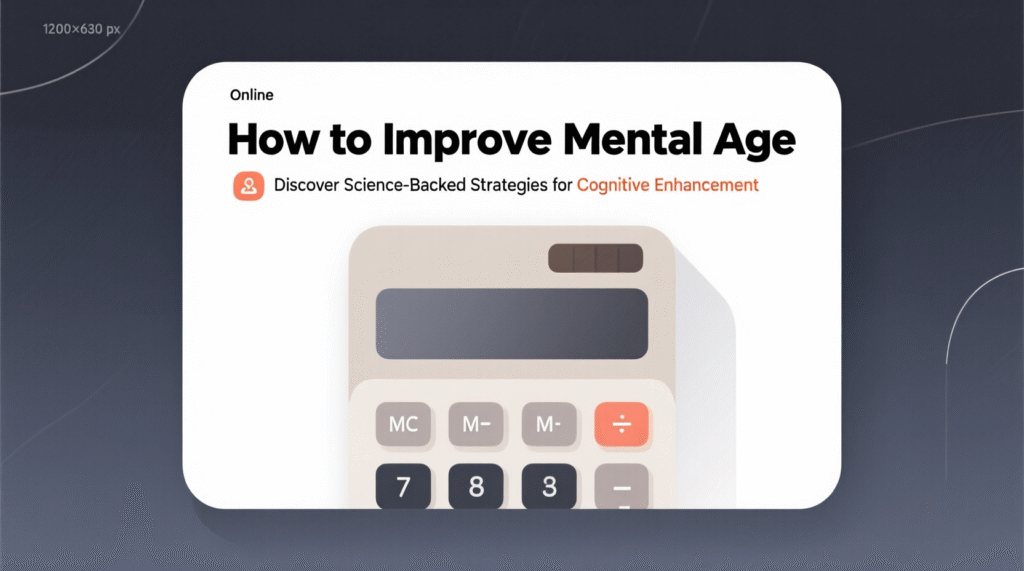
Your mental age is a reflection of how mature your mindset feels compared to your actual age. Unlike your chronological age, which moves forward every year, your mental age can shift depending on your experiences, habits, and emotional growth.
The good news? You can actively improve it. By strengthening emotional intelligence, building resilience, and expanding your perspective, you can raise your mental age and feel more capable in handling life’s challenges.
You can improve your mental age by:
- Developing emotional intelligence
- Reflecting on life experiences
- Strengthening decision-making skills
- Managing stress effectively
- Staying curious and connected
Let’s break each down.
5 Habits That Make Your Mind More Mature
Build Emotional Intelligence
A higher mental age often comes from understanding yourself and others better. Emotional intelligence (EQ) helps you respond instead of react.
How to do it:
- Name your emotions when you feel them.
- Pause before replying in conflict.
- Practice empathy in daily conversations.
Emotional balance is key to maturity — explore more in emotional maturity.
Reflect on Experiences
Life itself teaches, but reflection turns experiences into growth. Without reflection, lessons are easily lost.
Practical steps:
- Keep a short daily journal: “What did I learn today?”
- After setbacks, ask: “What will I do differently next time?”
- Celebrate wins as much as failures—they both shape maturity.
Strengthen Decision-Making Skills
Mental age shows most clearly in the choices you make.
Ways to improve:
- List pros and cons before big decisions.
- Ask yourself: “How will this affect me in 5 years?”
- For impulsive tendencies, set a 24-hour rule before acting.
Explore the difference between mental growth and emotions in mental age vs emotional age.
Manage Stress with Healthy Coping
Resilience is a key marker of maturity. Stress can make you feel overwhelmed or push you to grow.
Try these strategies:
- Practice mindfulness or breathing exercises.
- Move daily—walks, stretching, or exercise improve clarity.
- Face problems step by step instead of avoiding them.
Stay Curious and Keep Learning
Lifelong learners often feel both younger and wiser at the same time. New knowledge strengthens mental flexibility.
Simple actions:
- Read on topics outside your expertise.
- Learn a new skill or language.
- Ask “why?” more often instead of rushing to answers.
Compare different maturity stages in our comparison guide.
Quick Table: Habits That Improve Mental Age
| Habit | Why It Helps | Example Activity |
|---|---|---|
| Build Emotional Intelligence | Improves empathy, control, maturity | Take an EQ test, practice pausing |
| Reflect on Experiences | Turns events into wisdom | Journaling daily lessons |
| Decision-Making Skills | Prevents impulsive errors, adds foresight | Use a 24-hour decision rule |
| Stress Management | Builds resilience, maturity under pressure | Mindful breathing, walking |
| Stay Curious & Learn | Expands perspective, keeps mind sharp | Learn a new skill |
FAQs on Improving Mental Age
Can mental age really change?
Yes. Life events, habits, and personal growth can all shift your mental age.
What’s the fastest way to improve mental age?
Practicing emotional awareness and reflection has the quickest impact.
Does education affect mental age?
Absolutely. Exposure to diverse knowledge broadens perspective.
Is a high mental age always better?
Not necessarily. Balance matters—wisdom and playfulness can coexist.
Final Thoughts
Improving your mental age is about building maturity while keeping curiosity alive. By strengthening your emotional intelligence, reflecting on experiences, making thoughtful decisions, managing stress, and staying curious, you can create a mindset that feels balanced, wise, and adaptable.
- One of the first steps to improvement is recognizing the signs of emotional maturity in your daily interactions.
- Many people ask if maturity can be measured accurately to track their personal progress.
- Growing your mind requires understanding the gap between mental and intellectual age.
- Biological factors often dictate when men fully mature regarding impulse control.
- Statistics reveal which age group scores highest on cognitive performance benchmarks.
- It is vital to maintain healthy habits since issues can worsen with age without care.
- You can use specific tools to calculate the mental age of a person based on their lifestyle changes.